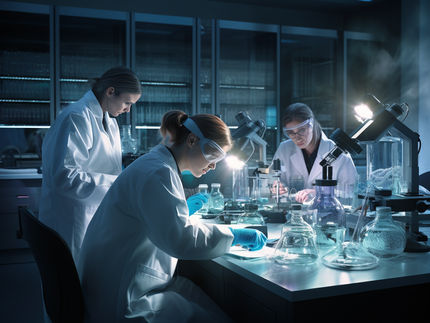Enzymes open up new avenues in the chemical industry
BASF steps up White Biotechnology operations
Advertisement
BASF is stepping up its operations in the area of enzyme research. To this end, the company has now signed a cooperation agreement with the Center of Excellence in Biocatalysis, Biotransformation and Biomanufacturing (CoEBio3). The alliance with this research facility affiliated with the University of Manchester is planned for a period of three years. BASF is funding the activities to the tune of EUR 1 million.
BASF uses enzymes for White Biotechnology. These biocatalysts used for instance to manufacture intermediates for the pharmaceutical industry. However, BASF researchers believe that the range of potential applications is much greater - for example, in the production of novel polymers for the cosmetics industry and for surface treatment of textiles.
"The staff of the newly set up institute in Manchester have a wealth of experience in enzyme screening and optimization," says Dr. Alfred Hackenberger, head of the Specialty Chemicals Research division, outlining the thinking behind the cooperation. "A major advantage is that chemists and biologists work hand in hand and target their efforts toward meeting the requirements of industry," Hackenberger adds. The research alliance will allow BASF to benefit from the know-how of scientists based outside the company. In addition, the university will undertake the very time-consuming basic research involved.
As part of the deal, the British scientists will be responsible for screening for enzymes of potential technological benefit, among other responsibilities. The screening activities will mainly focus on soil. One gram of soil contains more living microorganisms than there are people on the planet. All these microorganisms depend on a large number of enzymes for proper metabolic functioning and to enable them to cope with a range of environmental conditions. For instance, enzymes are what make living organisms able to digest nutrients and eliminate toxins.
However, the alliance partners are not only responsible for discovering new enzymes. They also plan to optimize the performance of already known biocatalysts with the aid of directed evolution methods.
Most read news
Topics
Organizations
Other news from the department science

Get the life science industry in your inbox
By submitting this form you agree that LUMITOS AG will send you the newsletter(s) selected above by email. Your data will not be passed on to third parties. Your data will be stored and processed in accordance with our data protection regulations. LUMITOS may contact you by email for the purpose of advertising or market and opinion surveys. You can revoke your consent at any time without giving reasons to LUMITOS AG, Ernst-Augustin-Str. 2, 12489 Berlin, Germany or by e-mail at revoke@lumitos.com with effect for the future. In addition, each email contains a link to unsubscribe from the corresponding newsletter.






















































